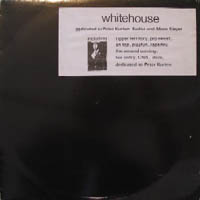
A whole bunch of stuff about Whitehouse, of course. Bit futile me saying that this was an issue not worth spending much time thinking about, eh?
I can see where Matt is coming from, because my interest in Psychic TV and industrial culture stemmed from my rejection of religion (tho I “only” went to Church every Sunday). We can get bogged down in a discussion about the motivations of people involved (i.e. the transcendental vs wallowing in the badness) but all I really have to go on is my own experience.
Quite tellingly a lot of people I know immersed themselves in that stuff and came out the other side OK, without feeling the need to stay there in perpetuity. So I regard my involvement with T.O.P.Y. as being something of an apprenticeship – a precursor to other stuff. I\’92ve been thinking about this quite a lot recently because I’ve been asked to do a talk on it next year, which will be an exercise in score-settling, ego-masturbation and contextualisation. Heh.
Ingram, Luka and Mark all seem to think it’s important to discuss artistic responsibility and I don’t see the point. Surely artists, almost uniquely, have a duty to be irresponsible? To provide a bit of danger in an increasingly sanitised world? Why “must” art always be about making the world a better place? And who decides whether people’s intentions are pure enough?
I remember interviewing Andy Martin of Academy 23 about getting into industrial stuff and he said it was the first music which actually meant anything to him. The alternative at the time was Abba who banged on about love and how great it was to be rich, whilst his experience was coming from a desperate family situation, being sectioned, being harassed by the police and basically feeling pretty pissed off with life. So, for him, Throbbing Gristle came as a total validation of his existence in a way.
Mark makes a good distinction between “shocking” and “disturbing” but I can’t help but feel that the latter is merely a more sophisticated version of the former. Whitehouse are modelling themselves on something completely anti-social and yet they are reaching out to the public by dint of releasing records and performing. Clearly people involved with the activities they glorify do not publicise them, and will go to enormous lengths to ensure that nobody else knows about them. So it cannot be the case that Whitehouse, in reality, are indifferent to people and their responses to their work.
I also received a fascinating email from Marcus at Rephlex last night, which I must confess I read when I was pissed, so it’s all a little hazy. (Marcus, sorry to be so crap at responding to emails. Big up ya status!)
Marcus recently attended a talk by William Bennett (and I think Phillip Best) about Whitehouse’s work. Which is clearly a shift – a deliberate attempt to engage with the audience. It sounds very interesting and from what I remember in my hungover state, Marcus got the impression that Bennett was very interested in the audience’s reaction and was in fact on a mission to evoke a particular response in them (i.e. fear/danger/liberation). The question then is – does that take power away from what Bennett is trying to do (a recognition that the game is up after 20 years?)
I do take Mark’s point about fascism being a trap – mere human politics, compared to what Whitehouse are attempting. (In fact I remember them doing two tracks: “BirthDeath” and “Politics” which both consisted of nothing – silence.). But as a part of the rejection of fascism comes a commitment to “libertarianism” which, although vague, is still some kind of (moral?) framework. Far better (from the point of view of cultivating a mythology) to not come down on either side of the fence, I would imagine. Death In June (and their clones) have made a successful career about being ambiguous about fascism.
Coming back to the religion thing, I think the precise point that Matt was making was not that Whitehouse were “anti-religious” (which I would take to mean a completely materialist, rationalist, atheistic worldview) but that they represented an “evil” form of spirituality – an inversion of the white light of xtianity.